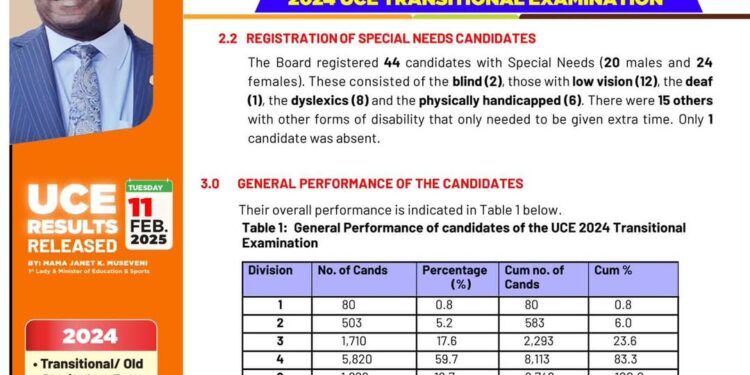This is the first time in Uganda’s history that learners have sat for UCE examinations under the new curriculum, a reform aimed at equipping students with critical thinking, research, and problem-solving skills.
The 2024 UCE examinations comprised two sets of exams. The Transitional Examination was the final exam conducted under the old curriculum, providing a pathway for students who had studied under the traditional content-based system.
The Competency-Based Examination introduced new assessment methods, with an emphasis on practical skills, research, and continuous assessment, departing from the previous system that heavily relied on memorization and written exams.
While speaking during the release of the results on Tuesday, UNEB Chairperson, Professor Celestino Obua noted that initial skepticism surrounded the competency-based approach, with concerns over its implementation and effectiveness. However, UNEB, working closely with the National Curriculum Development Centre (NCDC) and the Directorate of Education Standards (DES), successfully delivered a seamless assessment process.
One of the most significant shifts in the new curriculum is the grading system. UNEB abolished the traditional 1-9 stanine grading system (Distinctions, Credits, Pass, and Fail) and introduced letter grades (A, B, C, D, and E).
Prof. Obua outlined key considerations behind this decision, including making transcripts simpler to interpret, combining Continuous Assessment (CA) with End-of-Cycle examination scores, and focusing on what a learner can do rather than just marks obtained. The new transcript and certificate formats will also be cost-effective to produce while maintaining high standards.
Prof. Obua acknowledged concerns about how these learners would transition to Uganda Advanced Certificate of Education (UACE), given that the A-Level curriculum was still rooted in the old format. However, he revealed that, under the guidance of the Education Ministry, the A-Level curriculum has been restructured to align with the competency-based model, ensuring a smooth progression for students.
In a significant milestone, UNEB announced that it has been awarded the ISO 9001:2015 Certification, an internationally recognized standard for quality management systems. This achievement underscores UNEB’s commitment to global best practices in examination administration, marking, and certification.
Prof. Obua emphasized that this certification guarantees international recognition for UNEB’s systems and processes, further strengthening Uganda’s position in global education standards.
Prof. Obua expressed deep appreciation to teachers for guiding students through the new curriculum, examiners, and scorers for their diligence in marking scripts, institutions that hosted the marking process, and UNEB’s ICT team, which developed in-house programs for data management, from receiving Continuous Assessment scores to final results processing.
With the first batch of competency-based learners now set to transition to A-Level, Uganda’s education system is poised for a major transformation. The new curriculum, while initially met with skepticism, has been praised for producing students with better communication, confidence, and research skills.
The 2024 UCE results not only mark the end of an era for the old curriculum but also set the foundation for a more skills-oriented education system one that could shape Uganda’s workforce and economy in the years to come.
Do you have a story in your community or an opinion to share with us: Email us at editorial@watchdoguganda.com













